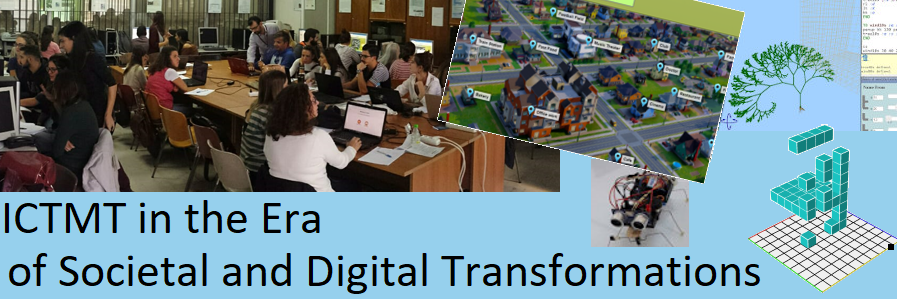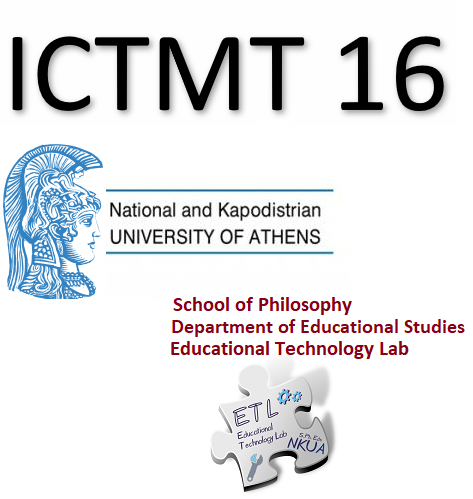
About the conference
The 16th International Conference on Technology in Mathematics Teaching, also known as ICTMT 16, will be held in Athens from June 7 to June 10, 2023.
The conference is organized by the Educational Technology Lab, Department of Educational Studies, School of Philosophy, National and Kapodistrian University of Athens.
The ICTMT conference series is unique in bringing together lecturers, teachers, educators, curriculum designers, mathematics education researchers, learning technologists, and educational software designers – all who share an interest in improving the quality of teaching and learning. Through its character, the conference provides a forum for researchers and practitioners in this field to discuss and share best practices, research approaches and results, theoretical know-how, innovation, and perspectives on educational technologies and their impact on the teaching and learning of mathematics.
This biennial conference began in Birmingham, UK, in 1993, under the influential enterprise of Bert Waits from Ohio State University. The 15th conference was held by the Danish School of Education, Aarhus University, in Copenhagen, Denmark, in 2021 (ICTMT 15 website).
ICTMT 16: http://ictmt16.eds.uoa.gr/
National and Kapodistrian University of Athens (NKUA): https://en.uoa.gr/
Department of Educational Studies, School of Philosophy: https://en.eds.uoa.gr/
Educational Technology Lab of NKUA: http://en.etl.eds.uoa.gr/
First announcement
We are happy to announce that the 16th International Conference on Technology in Mathematics Teaching, also known as ICTMT 16, will be held in Athens from June 7 to June 10, 2023.
The conference is organized by the Educational Technology Lab, Department of Educational Studies of the School of Philosophy, National and Kapodistrian University of Athens.
ICTMT 15 in Copenhagen highlighted from a broad perspective, how technology facilitates the multiple “Connections and Connectivity” in mathematics education, focusing on the relationships between people teaching and learning mathematics and researching mathematics education around the world (students, teachers, researchers, policymakers, etc.), learning environments, ideas and strategies to teach, to exploit assessment for learning.
The upcoming ICTMT 16, in Athens, will adopt a transformational approach to Mathematics Education. We will welcome perspectives trying to make sense of mathematics education in an era of intense, unpredictable, complex, ill-defined societal and digital transformation. How can digital technologies become an integral tool in the ways rationality and mathematical thinking is cultivated in schools transforming from an academic to a citizenship paradigm? How can we use digital media to instill rationality and mathematical understanding in individual and collective citizenship? What is the value of mathematics in the so-called 21st century skills movement in education focusing on trans-disciplinarity and the grappling with socio-scientific issues? What can STEM and STEAM bring to mathematics education in this context? How can programming, computational thinking and modeling bring added educational value to the teaching and learning of Mathematics? What kind of educational practices and uses of digital media can we expect to value in the digital transformation era?
Under this frame, the conference will be organized in the following themes.
1. Designing technology for a transforming society
for mathematical learning and its assessment in the Digital Transformation Era – a focus on theoretical or actual ‘designs’ with contributions from researchers, industry and teachers.
2. Making sense of educational practice in a transforming society
with and through technology – a focus on the work of teachers and lecturers,
where the classroom might be geographically located or mobile. What kind of practice can we envisage having value in the near future? Again, contributions could be both theoretical and practical.
3. Fostering mathematical collaboration and communication
with and through technology – a focus on the communications’ aspect of
technology, including assessment strategies. What kinds of communication may promote mathematical thinking and rationality in the Transformation Era.
4. Understanding the value of Analytics and AI in Mathematics Education
how can mathematical understandings support the understanding of analytics and algorithms used in popular media? What kind of user information could be capture-worthy for mathematics education? How can analytics support rather than restrict creativity and agency in meaning-making?
The connection between theory and practice around using digital media for teaching, investigating, and learning mathematics, as a fertile ground to discuss the challenges to come and possible pathways for the next years in mathematics education. In a social environment that changes in multiple directions, what does academic research (theory) gain from the study of practice in domains like the role of teachers and students, the teaching profession, the curriculum design, the learning outcomes concerning competencies, assessment of the learning and teaching procedure, functionalities of novel digital tools, etc.? And does practice benefit from new theoretical approaches, or classical ones implemented innovatively, and how?
We invite researchers in mathematics education to submit a paper or poster, related to the focus of the conference and to at least one of the conference’s four themes that will be announced soon.
We also invite teachers that are interested in presenting and discussing with colleagues and academic researchers, best practices for teaching mathematics with the use of digital media, to submit their best practice proposals, in relation to the four themes of the conference.
The themes along with the deadlines for the electronic submission and registration will be announced shortly.For more details, please visit http://ictmt16.eds.uoa.gr/ .
|
Chronis Kynigos Chair International Program Committee |
|
|

